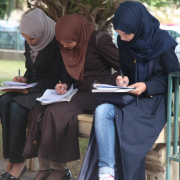Speeches Shim
USAID, along with its partners, provides election-related technical support and advice to Libyan government institutions with election-related responsibilities on topics including electoral regulations and procedures, strategic communications, campaign finance, electoral dispute resolution, and inclusion of marginalized communities. USAID/Libya seeks to strengthen citizens’ confidence in the elected government through ensuring the integrity of elections, allowing them to democratically elect their leaders, who will in turn strengthen their capacity to represent the diversity of interests voiced by Libyan citizens. USAID also supports organizations that represent women, people with disabilities, youth and other marginalized and minority groups to enhance their participation in electoral and political processes.
USAID, along with its partners, provides election-related technical support and advice to Libyan government institutions with election-related responsibilities on topics including electoral regulations and procedures, strategic communications, campaign finance, electoral dispute resolution, and inclusion of marginalized communities. USAID has recently partnered with the Ministry of Education (MoE) to create a new civic education curriculum for junior high, high school, and university students, and also cooperates with civil society to build civic awareness and understanding of Libya’s political transition as well as enhance citizens’ meaningful participation in electoral and political processes.
USAID, partnering with local non-governmental organizations (NGOs), continues to support national dialogue and consensus building among different segments of Libyan society. USAID supports the work of the Constitutional Drafting Assembly (CDA) with expert legal professionals and by supporting the input of women’s rights activists, the disabled community, and other minority groups into the drafting process. USAID is also supporting communication efforts nationwide regarding the draft constitution and its contents and other civic topics of discussion to build public awareness and a more engaged citizenry.
The Libya Local Governance and Civil Society (LGCS) Program, locally known as “Taqarib ” (the Arabic term for coming together or growing closer), aims to strengthen the foundations for a more unified Libyan state. To do this, Taqarib will empower local governments, reinforce community bonds, promote citizen engagement in public dialogue, and prioritize public resource allocations. The program will also link enhancements to service delivery at the municipal level with national efforts to improve the execution of decentralization policy and to further evidence-based reforms.

Libya has a substantial natural resource base, abundant human capital, and access to potentially lucrative trade routes, but lack of national cohesion and purpose impedes its movement along the path to self-reliance. The ongoing military stalemate risks plunging Libya into a prolonged civil conflict. Without greater stability in the security environment, economy, and civic life, Libyans will fail to reap the benefits of a transition to democracy and face further obstacles to trade and investment.


Comment
Make a general inquiry or suggest an improvement.